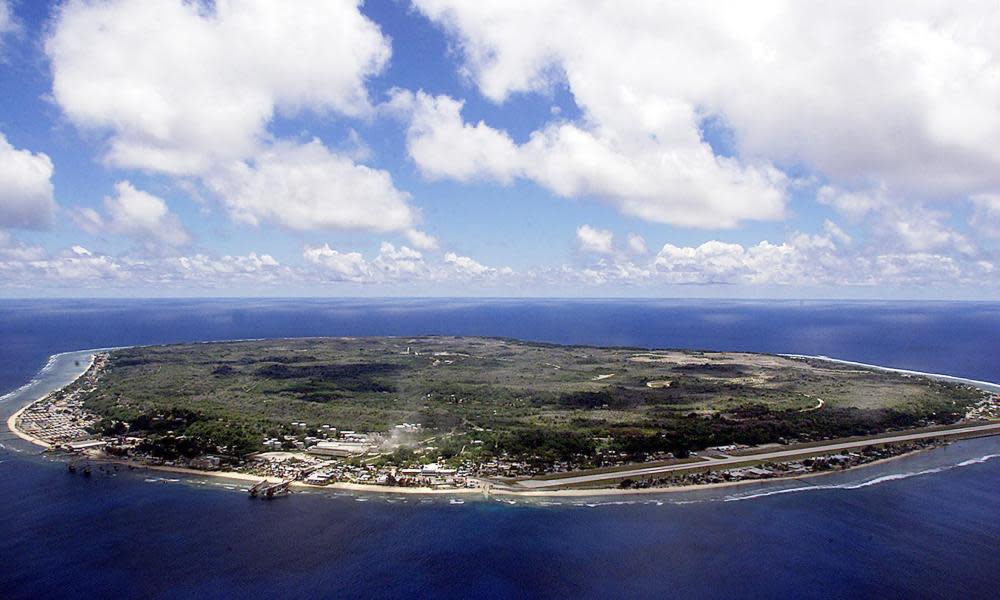Last refugee on Nauru evacuated as Australian government says offshore processing policy remains

The last refugee held by Australia on Nauru has been evacuated off the island, flying into Brisbane on Saturday night, marking the end – at least for now – of more than a decade of offshore processing on the Pacific island.
However the Australian government says it remains committed to offshore processing as a policy. It maintains an offshore detention centre in abeyance on the island, at an annual cost of $350m, which it says is “ready to receive and process any new unauthorised maritime arrivals”.
Human rights and refugee advocacy groups have welcomed the end of offshore processing on Nauru, but said many of those held suffered irreparable damage in indefinite detention on the island.
“All my friends are so happy this week,” Betelhem Tibebu, a human rights activist and refugee previously held on Nauru, said. “We don’t have to lose any more friends, people don’t have to get sick, no trauma, and no fear. Nauru, it killed us mentally, for us Nauru is hell, where we lost our lives.”
Australia’s second iteration of offshore processing on Nauru began in September 2012. The number of refugees and asylum seekers held on the island peaked in August 2014 at 1,233 people.
A handful of flights over the past month has seen the final remaining refugees transferred off the island. Two asylum seekers will remain on the island, facing domestic legal charges, and one refugee has married on Nauru and has chosen to remain.
Sign up for Guardian Australia’s free morning and afternoon email newsletters for your daily news roundup
There are still 80 refugees and asylum seekers held in PNG, most in Port Moresby.
At least 14 people have died in offshore detention since it was restarted in 2012, including being murdered by guards, through medical neglect and by suicide.
Tibebu said many refugees evacuated from Nauru in recent months and years had lived still with a fear they could be forcibly returned.
“Every six months when we renew our visa we hear that we can be sent back to Nauru. I never sleep peacefully because I worry they will take us back at night, not just me but all of us … I am happy no one is there now.”
Ian Rintoul, spokesperson for Refugee Action Coalition, said Australia’s offshore detention record on Nauru “will forever stain the record of both sides of Australian politics”.
“Though they committed no crime, refugees sent to Nauru lost 10 years of their lives.
“As long as Nauru remains open and refugees remain in limbo in PNG, the dark chapter of offshore detention will not be finally closed. The last refugees may be off Nauru, but more than 80 refugees still in PNG need to be safely evacuated.”
Jana Favero, director of advocacy at the Asylum Seeker Resource Centre, said “one chapter of misery is over” and praised the government’s action in evacuating the remaining refugees and asylum seekers.
“Over the past decade our government stood by and witnessed abuse, assault, neglect, harm and suffering in offshore detention. Men, women and children sought safety and protection, yet we banished them simply for the sake of politics.”
Related: ‘My wife thinks I have a beautiful life’: refugees face uncertain future as Australia clears Nauru
Favero said the 80 refugees and asylum seekers still held in PNG must also be removed from the limbo of offshore processing.
The government confirmed last month in Senate estimates that it would continue to pay $350m as a “contingency”, for its “enduring” offshore capability on the island. The US private prisons operator MTC, a company with a controversial history running detention centres, has a three-year contract for “garrison and welfare” services.
Ahead of the final flight off the island, a spokesperson for the department of home affairs said Australia’s border policies had not changed and the Nauru processing centre stood “ready to receive and process any new unauthorised maritime arrivals, future-proofing Australia’s response to maritime people-smuggling”.

 Yahoo News
Yahoo News 
